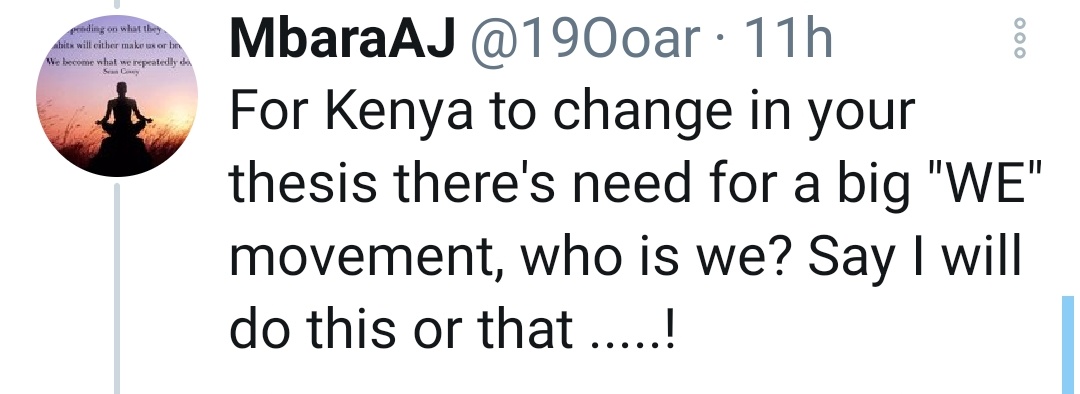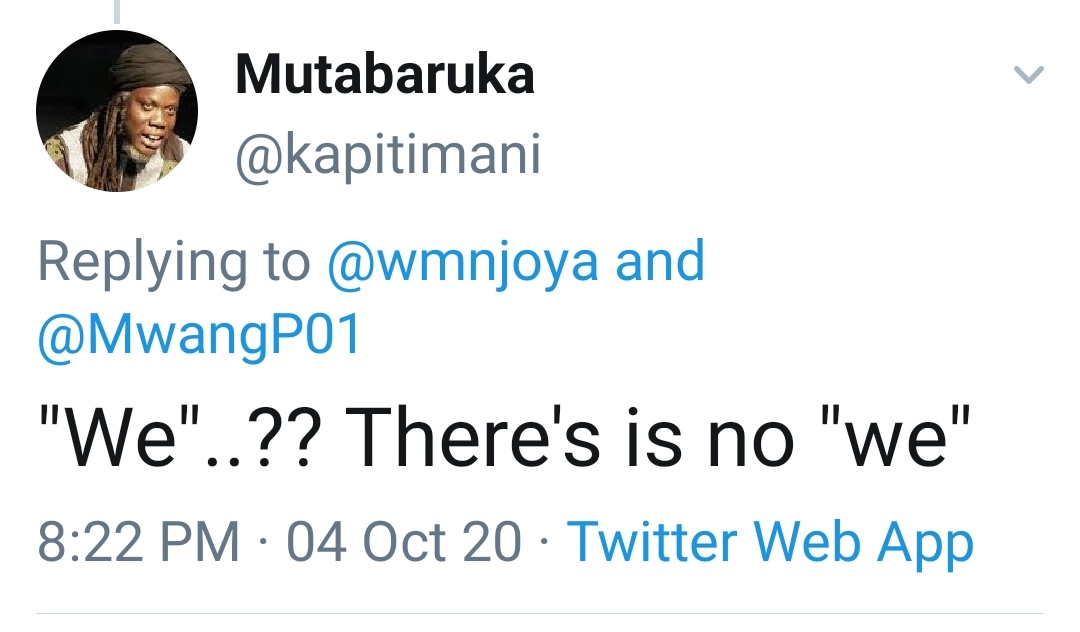Democracy is practiced through speech. It is through people talking and telling stories that we find the truth and act together.
That's why Kenya mainstream tries to shut us up without directly saying "shut up." They don't want us to 1. see power 2. know we're powerful in speech
That's why Kenya mainstream tries to shut us up without directly saying "shut up." They don't want us to 1. see power 2. know we're powerful in speech
There are a number of tactics through which we are bullied and injured using language.
One is to tell us that we must never speak as plural. We must limit all our words to our individual being.
One is to tell us that we must never speak as plural. We must limit all our words to our individual being.
Notice that this tactic is never used on politicians. Wanasema "sisi kama jamii, au "sisi wakenya" and nobody ever questions about talking in our name.
Saying "we" is a crime for us, because the more we talk "we," the more potential we have to find out how to act collectively.
Saying "we" is a crime for us, because the more we talk "we," the more potential we have to find out how to act collectively.
Another tactic or shutting us up is to tell us that all we're doing is tweeting and nothing else.
But how will we know what to do if we don't speak so that we get fresh ideas or refine the ones we have?
And if tweeting is so ineffective, why are they bothered?
But how will we know what to do if we don't speak so that we get fresh ideas or refine the ones we have?
And if tweeting is so ineffective, why are they bothered?
And the people who tell us to stop talking are the ones who spend week days in toxic committee meetings that prevent people from working.
They have no lessons to teach us.
They have no lessons to teach us.
The third way of shutting us up is what the media does. When you raise your voice against government policy, they ask you what you can do or to offer a solution.
I learned this during the debates on CBC. It was so passive aggressive and so effective.
I learned this during the debates on CBC. It was so passive aggressive and so effective.
On the same media panel, KICD people would talk about funds disbursed, teacher training and textbooks, and then media would ask me what can be done. How could I compare with people who can make large scale moves? And Kenyans didn't see how they were being manipulated.
The point of "doing" answers is to say that the train has left the station, and unless we're a CS or the president, there's nothing we can say or do. I used to leave media interviews feeling small and useless for raising questions. And that's how the mainstream wants us to feel.
The 4th tactic of weaponizing language is to reduce our words to the dictionary meaning. We're accused of generalizing, we're told to do fact checks, or if we use metaphors, we are ridiculed with the literal meanings.
An example: suppose I say "politicians are thieves."
An example: suppose I say "politicians are thieves."
This is what the digital batallion of silencers says:
1. Give an example of a particular politician (The "not all" fallacy)
2. How many politicians do we have and what is the exact figure of money stolen? #FactCheck
3. What did politicians steal (from you)?
1. Give an example of a particular politician (The "not all" fallacy)
2. How many politicians do we have and what is the exact figure of money stolen? #FactCheck
3. What did politicians steal (from you)?
What they have done here is to use the dictionary meaning of politicians and thieves, when what I may have been referring to is the fact that our work, confidence and resources are drained by the political elite.
It's the same tactic as the anti-"We" brigade. Limit our words so narrowly to our individual selves and to dictionary meanings and approved facts, that we cannot talk beyond ourselves. It's a mental prison that can mess you up mentally if you are not careful.
Because with these tactics, you're basically being told that you are not social, and so
1. there's nothing you can do about the things that happen to you, even for things done to you by someone else. Which means that
2. everything that happens to you is your fault.
1. there's nothing you can do about the things that happen to you, even for things done to you by someone else. Which means that
2. everything that happens to you is your fault.
and
3. If your life is miserable, the only thing to fix is yourself and nothing around you.
This mental and discursive (related to discussion) imprisonment is so effective, it has made the Kenyan middle class terrified to use their knowledge and has increased mental illness.
3. If your life is miserable, the only thing to fix is yourself and nothing around you.
This mental and discursive (related to discussion) imprisonment is so effective, it has made the Kenyan middle class terrified to use their knowledge and has increased mental illness.
In a nutshell, what do we need to understand about speech (written or oral)?
1. Speech gives meaning. We can't understand what things mean unless we talk about them. And meaning is not determined by the dictionary or official fact checkers alone.
1. Speech gives meaning. We can't understand what things mean unless we talk about them. And meaning is not determined by the dictionary or official fact checkers alone.
Meaning is also determined by reality, experience, our intentions and an infinite number of things. And we can't know what is influencing meaning unless we speak.
2. Speech is more than literal words. Speech communicates emotion, social being and even action. If I say "we will rise up against oppression," I'm not just talking about what will actually happen. I'm expressing an aspiration. I'm looking for community.
3. We cannot have speech that has no generalization. Surely, we cannot fact check every single thing, and even then, who are the fact checkers and what information are they using to factcheck? I think fact check is a form of Western cultural imperialism to prevent African speech.
Mark you, I'm not endorsing everything Trump and the right wing say, even when it is not factually correct. But for me to clarify what I mean, I need to speak.
Moreover, what Trump does is not a problem of facts, like Twitter and other liberals would have us believe.
Moreover, what Trump does is not a problem of facts, like Twitter and other liberals would have us believe.
The problem with what Trump says is not the words but the politics he promotes. But the liberal (center of spinelessness) media sticks to the fact because they want to leave the power dynamics intact.
But I've digressed.
But I've digressed.
Neoliberalism has so thoroughly narrowed what our speech can do, that now we're fighting over a small space of what we can talk about instead of breaking down the walls that narrow that space.
To learn more on this violence through language, visit my Maisha Kazini channel.
To learn more on this violence through language, visit my Maisha Kazini channel.
I first heard of this concept of violence from @TweetingBandit, and he explains more about how it's related to media and pirate sector.
I then developed that idea in a playlist entitled "Kenyan narratives of public life" https://youtube.com/playlist?list=PLJV3qPGogwHhc0ADq318Q9a_9064hJcs2
Coming up shortly on Maisha Kazini is a conversation with @lewgord when he elaborates on the importance of speech for democracy.
And watch for the common response to my thread. The silencing brigade won't read, and will debate me on the meaning of democracy (by which they seem to reduce democracy to elections or the fact that we are not as good as the wazungu).
You can't win with these guys.
END
You can't win with these guys.
END

 Read on Twitter
Read on Twitter



